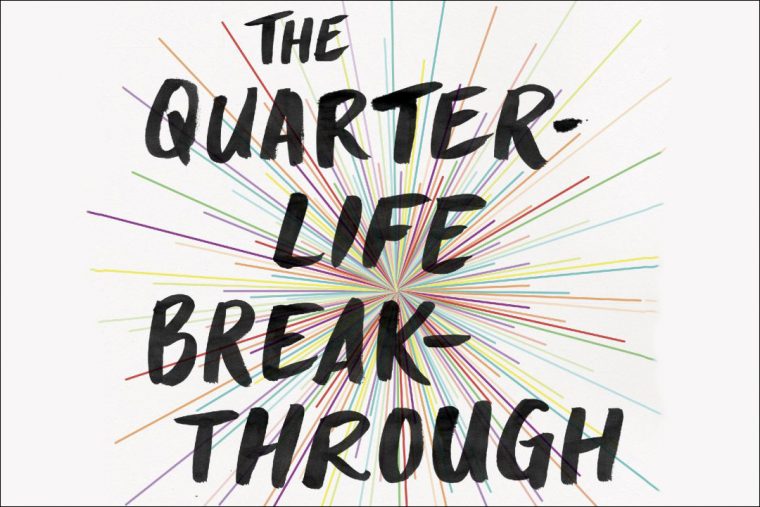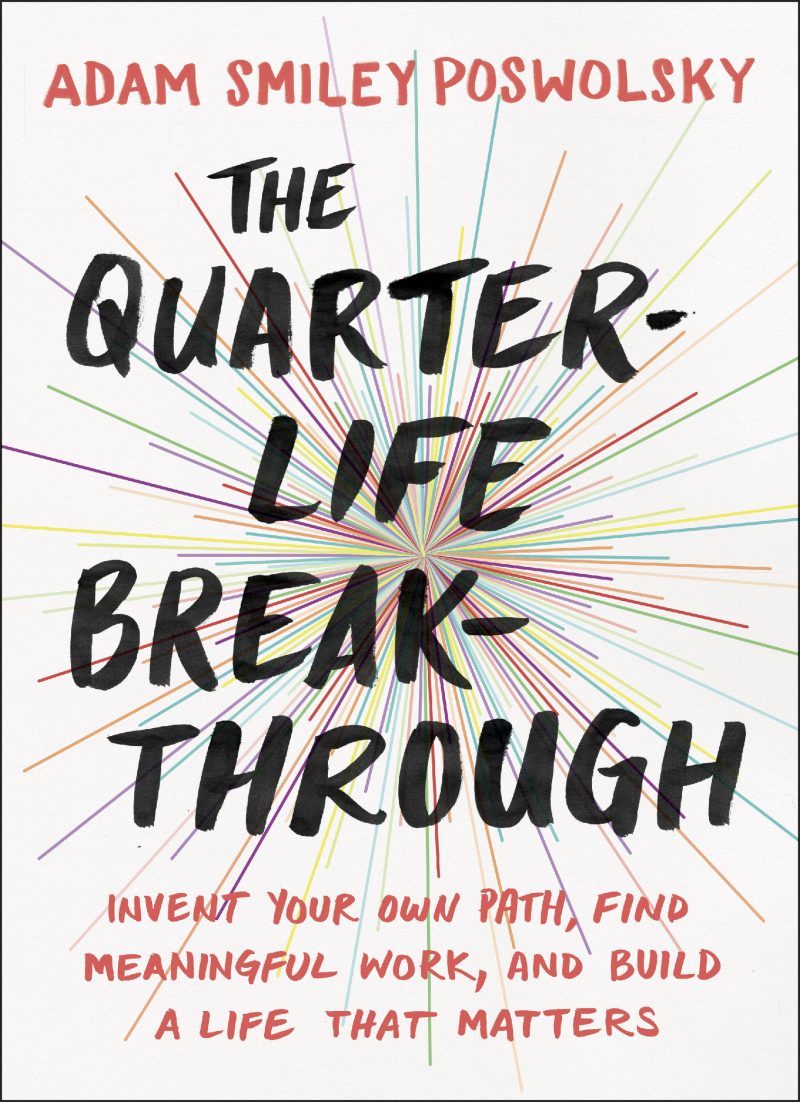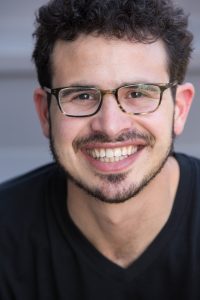Poswolsky ’05 Pens The Quarter-Life Breakthrough

 Author Adam “Smiley” Poswolsky ’05 talks to News @ Wes about his new book, The Quarter-Life Breakthrough: Invent Your Own Path, Find Meaningful Work, and Build a Life That Matters (TarcherPerigee/Penguin Random House, 2016). Learn more about Poswolsky’s work at smileyposwolsky.com.
Author Adam “Smiley” Poswolsky ’05 talks to News @ Wes about his new book, The Quarter-Life Breakthrough: Invent Your Own Path, Find Meaningful Work, and Build a Life That Matters (TarcherPerigee/Penguin Random House, 2016). Learn more about Poswolsky’s work at smileyposwolsky.com.
What did you major in at Wesleyan and how did that influence your career path out of college? Did you always know (or at least think you knew!) what you wanted to do with your life? If so, were you surprised when that belief was challenged by your actual experience?
I majored in film studies at Wesleyan, so after graduation I moved to New York City and worked in film production for two years as a location scout and production assistant. I thought filmmaking was my calling, so I was surprised to find out that I actually wasn’t that inspired by film production. The hectic film sets, the massive trucks, the brutal hours and long nights, the stressful months of pre-production, the crew members chain-smoking on set; it seemed out of sync with why I loved studying film at Wes, which was my interest in film as a medium for social change. The film major at Wes teaches you how to make movies, but more importantly, it teaches you how to craft a compelling narrative; it teaches you about perspective and persuasion. Those are the lessons that continue to inform my work today as a writer and public speaker—it’s not the fact that I was a film major, it’s that I learned how to share my story.
This is why it’s so important to gain on-the-ground experience in a field you’re interested in, even if it’s an internship, an apprenticeship, a part-time gig or a volunteer opportunity. Only 27 percent of college graduates end up working in a field that’s related to their college major. Actually working on seven or eight different films—some small indie films, some large Hollywood productions—made me realize that I didn’t want to be a filmmaker; I was far more interested in empowering people to find meaningful work through writing, speaking and community building.
Was there a single ah-ha moment that inspired you to write The Quarter-Life Breakthrough or was it a gradual realization?
It was a gradual realization that I was stuck in a job and city that weren’t the right fit for me. I was working as the special assistant to the director of global operations at the U.S. Peace Corps in Washington, D.C., and I felt guilty for wanting to leave a job that looked great on paper but, in reality, kept me up at night and even gave me shingles. I had a good salary, health care, benefits and job security (you literally cannot get fired from working for the federal government)—and this was in 2010 through 2012, in the aftermath of the recession. I felt guilty for wanting to leave a job that everyone else thought was awesome. Finally, in 2012, I attended a social innovation fellowship program called StartingBloc, where I met lots of young entrepreneurs and change-makers who were chasing their dreams. One friend said to me, “Smiley, why would you be doing anything less than reaching your full potential in life?” It hit me hard. So, after months of saving up enough money, I left my job, moved to San Francisco and started writing about career fulfillment.
What’s the difference between following your passion and finding your purpose?
The blogosphere always talks about finding your passion, which oversimplifies the challenges of finding meaningful work. It’s like, “Okay, what if I have 11 passions? What if my passion is to start a yoga studio in San Francisco, but there are already 54 yoga studios on my block?” Passion is very inward-focused, very self-centered, while purpose is more about how you can help the people around you. I recommend millennials think less about what they love, and more about how they can serve the people they love—more about their purpose: How they can impact the lives of others. If you move beyond passion, and instead find the patience to keep learning about yourself, and the persistence to keep going when obstacles come your way, then even if you switch jobs every few years, your journey will be filled with many meaningful, life-changing opportunities.
Finding meaningful work takes time. It took me four years after my transition from my government job to truly feel like I’m having the impact I want to be having on the world: empowering young people to find work that makes them come alive and makes a positive impact. Four years is a long time. There have been many bumps along the road and times when I wanted to quit. Never once did my journey feel like one of those cool Instagram photos with the caption, “Just quit your job, follow your passion, be happy!” The journey ahead will be challenging, yet worth it.
People talk about how millennials are always job hopping—they never stick around for too long. While that’s often discussed as a negative, you say there are many reasons why the rules that apply to previous generations in the workforce don’t apply to millennials. Can you explain?
Millennials, on average, are leaving their job every two to three years. This means that some of us will have as many as 20 or more different jobs in our lifetime. But the truth is that rapid changes in technology and the job market have made all employees job-hoppers to some degree; the average employee of any age is leaving their job about every five years. The U.S. Department of Labor has noted that 65 percent of today’s kids will end up in jobs that haven’t been invented yet.

The corporate career ladder model is dead. We need to innovate college career departments and corporate HR departments to keep up with this new economy, which is more flexible and in flux than ever before. Even if you’re going into a more traditional career path, like law or medicine, your job is going to evolve and change with the times. We need to prepare our employees for an uncertain and unstable job market and give them the skills, training and tools to succeed across disciplines and job titles.
What are millennials looking for in their careers? Money? Time? Purpose? Upward mobility? What are the most important job benefits to millennials? How are they different than previous generations, for better or for worse?
In the next ten years, millennials will make up nearly 75 percent of the workforce. Based on the millennials I interviewed, stereotypes about entitled millennials couldn’t be farther from the truth. Millennials want to work—and despite being shackled by debt, recession and the jobs crisis, they aren’t motivated by money. Rather, they’re motivated by meaning. They’re driven to make the world more compassionate, innovative and sustainable. We aren’t the “me, me, me” generation. We are the purpose generation. Fifty percent of millennials would take a pay cut to find work that matches their values, 90 percent want to use their skills for good and according to Deloitte’s millennial survey, 75 percent of millennials say the business world is getting it wrong—that businesses are too focused on their own agendas, rather than on improving society.
Other generations also rank meaning as a top factor in determining workplace engagement—millennials are not the only ones looking for meaningful work, everyone wants to make an impact with their work. Yet so many companies fail to put purpose and people at the top of their agenda, and instead focus too much on profit. Then they are surprised when millennials want to quit their job. If you want to engage your employees, give them an opportunity to make a lasting social impact.
Can you explain what you call the “lily pad mindset”? How is this different from the long-established career ladder mindset?
Unlike the career ladder mindset, which forces you to move in only one direction (“up”), the lily pad career mindset visualizes your career as a pond of lily pads, a series of interconnecting leaps you’ve made between different opportunities. What’s holding everything together is the roots: what you care about and how you want to help the world. Your roots may be driving you to do one thing now, but that thing may change in five years.
I think a lily pad mindset is more relevant in a new workplace that requires embracing instability and recalibrating our career paths. For example, with a career ladder mindset, when I left my job in politics/international development at the age of 28, to move to San Francisco and become a writer, I would be basically be starting from the bottom of a new career ladder. With a lily pad mindset, I wasn’t starting over at the bottom (there is no bottom and no “top of the ladder”), I was simply taking all my previous experience in film, politics, and international development and applying my skills to my new path as a writer and speaker in San Francisco.
Instead of climbing a career ladder that might not be around in five years, I recommend you treat your career like a lifelong experiment. Every job, every experience, every place you travel is a chance to learn something new about yourself: what interests you (and importantly, what doesn’t), what you’re good at and what type of impact you want to have on the world. The lily pad mindset recognizes that careers are not linear; they are fluid and always growing.
Do you think you’ve found what you’re meant to do…or are you still looking? Or does that change…and is that okay, too?
I don’t think anyone has only one calling. Right now, I’m enjoying the work that I’m doing, empowering my generation to find meaning in the workplace. However, after Donald Trump won the 2016 election, I realized that even though I find my work very fulfilling, it’s not doing enough to create opportunities for our country’s most vulnerable populations, especially women, people of color and immigrants. I’ve been writing for four years about how millennials want meaning and purpose, and yet, millions of millennials didn’t even vote in the 2016 election. How is that possible?! It makes me sick. So now I’m in the early stages of creating a TV show/storytelling project called Millennial Vote, about increasing young voter turnout and engagement in the 2018 and 2020 elections.
As a writer and a creative, your work is always evolving. I think the work I’m meant to do is to empower others to find more meaning in their lives, but what that looks like day-to-day in terms of what book I’m writing or what cause I’m dedicating my time to, will always be changing based on my interests and what’s happening to the people I care most about. I think that growth is the sign of a healthy, vibrant work life.
What’s the best career advice you received and what career advice would you give to others?
My favorite career advice book is So Good They Can’t Ignore You by Georgetown University computer science professor Cal Newport. The thesis is that mastery leads to fulfillment. If you want to have a fulfilling career, become really good at something.
My advice to others, especially career changers or folks looking for a new job, is to focus on your community. Surround yourself with people who believe in the beauty of your dreams. Find the networks, meetup groups, conferences, fellowship programs, classes and support groups that offer inspiration, accountability and connections to get you where you need to go. A quarter-life, third-life, or mid-life breakthrough is not about how strong you are; it’s about how strong your community is.

